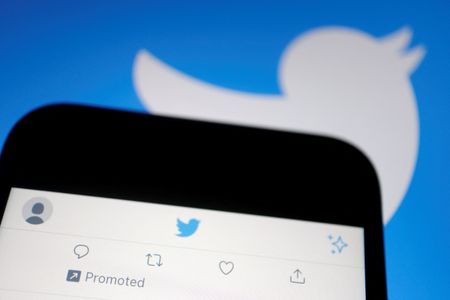By Sheila Dang
(Reuters) – Twitter-owner Elon Musk has said advertisers are returning to the social media platform, but statements from several companies and data from research firms suggest a bounce-back is not happening so fast.
Musk, who also runs electric carmaker Tesla Inc, earlier this week told the BBC that most of Twitter’s advertisers are returning to the platform and the business was “roughly breaking even.” Twitter had been hit by a massive decline in advertising since his acquisition in late October.
However, several companies, including snack maker Mondelez International, consumer products company Unilever, and Coca-Cola, that had been among Twitter’s top 10 advertisers before Musk took over, are no longer even in the top 50 advertisers in the past two months, according to data compiled by Sensor Tower.
Mondelez, Unilever and Coke did not respond to requests for comment. Mondelez CEO Dirk Van de Put told Reuters last fall the Oreo maker had pulled its ads from Twitter because of the risk they would appear next to the “wrong messages,” including hate speech.
The top 50 advertisers on Twitter spent a combined $83 million over the past two months, down from $102 million in the same period last year, according to Sensor Tower, a market intelligence firm.
Research firm Insider Intelligence this week slashed its forecast for Twitter’s global ad revenue this year by 37% to $2.98 billion. That would represent a 28% decline from Twitter’s 2022 ad revenue of $4.14 billion.
An emailed request for comment to Twitter, which no longer has a communications team, returned an automated reply with a poop emoji. Musk is set to speak at a major advertising conference in Miami on Tuesday, where he will address marketers seeking answers about his plans for Twitter.
Since acquiring Twitter, Musk has ordered a series of rapid changes that have rattled advertisers, including laying off thousands of employees to cut costs and rushing the launch of a subscription to let users pay to have their profiles verified.
His controversial tweets, including ones that linked to conspiracy theories or waded into debates about racism, have also given advertisers pause, ad buyers have previously told Reuters.
At a conference last month, Musk acknowledged a massive decline in advertising revenue and said he was forced to cut costs quickly.
Despite Musk’s comments that most advertisers are returning to Twitter, some major brands told Reuters that is not the case for them.
An AT&T spokesperson said the wireless carrier, which paused ads in September, had not returned. AT&T was previously No. 33 among Twitter’s top advertisers before Musk’s acquisition, according to Sensor Tower.
Automakers Volkswagen AG and Stellantis also said they had not resumed ads on Twitter. Mars, maker of M&M’s and Snickers, said it is not advertising on the platform.
Other advertisers formerly in the top 50 Twitter advertisers that were no longer on that list according to Sensor Tower included Merck & Co, Google, Kellogg and Facebook parent Meta Platforms.
Those companies did not respond to requests for comment about their ad spending.
“Many advertisers don’t trust him based on past behavior or don’t want to be associated with him,” Insider Intelligence principal analyst Jasmine Enberg said of Musk.
Web traffic to Twitter’s ad portal, a website that lets customers set up and purchase ads on Twitter, declined 18.7% in March from the same time last year, said research firm Similarweb, which analyzes traffic to the ad-buying websites of social media platforms.
Twitter’s ad business is “eroding” and its subscription product Twitter Blue is seeing only moderate success, Similarweb said in a blog post.
Twitter has the added challenge of competing for brands’ marketing budgets at a time when companies are cutting or reevaluating how much they spend on ads amid concerns about the health of the economy, Enberg said.
“They’re spending on platforms that they believe will provide them the highest return on investment, and that’s just not Twitter; it never has been,” she said.
Snap Inc, owner of popular app Snapchat, said in January that tough economic conditions could lead to lower first-quarter revenue.
Similarly, Alphabet’s Google, the world’s largest digital ad platform, posted disappointing quarterly earnings in February due to advertisers’ cutting their budgets. Alphabet and Snap both declined comment.
(Reporting by Sheila Dang in Dallas; additional reporting by Jessica DiNapoli in New York, Dawn Chmielewski and Deena Beasley in Los Angeles, David Shepardson in Washington and Victoria Waldersee in Berlin; editing by Ben Klayman and Leslie Adler)

